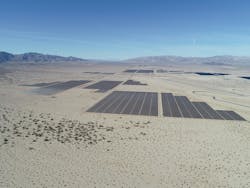Blackstone Energy Transition Partners Acquires Majority Stake in Renewable Engineer, Designer Westwood
Private equity giant Blackstone is expanding its stake in energy transition technologies and services with more than $1.3 billion of investment this summer.
The latest is Blackstone Energy Transition Partners’ majority acquisition of Westwood Professional Services Inc. from previous holder Endurance Partners. Westwood is an engineering and design firm focused on renewable energy and power projects in addition to its building infrastructure work.
Merger and acquisition deals, which were in a relative lull since the pandemic, have re-emerged with numerous transactions this summer. Earlier this month, power generator Generac announced its deal for microgrid controller technology firm Generac.
The Westwood Professional Services transaction deepens Blackstone’s recent $1.3 billion commitment to the infrastructure side of decarbonization projects. The company has worked on numerous grid distribution and transmission line build-outs as well as wind and solar farms, including the Athos Solar projects led by Intersect Power and other partners in California (pictured).
“Our partnership with the exceptional Westwood management team builds upon our recent energy transition investments, including Trystar and Sediver, providing critical services and equipment needed to facilitate more reliable, affordable, and cleaner energy,” David Foley, Global Head of Blackstone Energy Transition Partners, said in a statement.
Filling the OT Visibility Gap in Energy Infrastructure
Free Webinar w/ Dragos, ServiceNow and Swimlane
Register Here to See It When You Want
Blackstone, one of the largest private equity funds in the world, also has broadened its roster of energy firms focused on decarbonization and digitalization. In July, it announced a sizable investment in Symphony Infrastructure Partners, touted as one of Australia’s bigger energy transition services platforms.
Also in July, Blackstone funds acquired back electrical power provider Trystar. Trystar is focused on energy solutions for the industrial, commercial, data center, health care, and utility end markets, which are considered key target markets for microgrid deployment.
Earlier this year, Blackstone reported $1 billion raised for its fourth Energy Transition Partners fund. Overall, the private equity firm owns and manages more than $1 trillion in assets across many sectors.
In 2022, Blackstone contributed to a $3 billion investment in project developer Invenergy Renewables.
About the Author
Rod Walton, EnergyTech Managing Editor
Managing Editor
For EnergyTech editorial inquiries, please contact Managing Editor Rod Walton at [email protected].
Rod Walton has spent 17 years covering the energy industry as a newspaper and trade journalist. He formerly was energy writer and business editor at the Tulsa World. Later, he spent six years covering the electricity power sector for Pennwell and Clarion Events. He joined Endeavor and EnergyTech in November 2021.
Walton earned his Bachelors degree in journalism from the University of Oklahoma. His career stops include the Moore American, Bartlesville Examiner-Enterprise, Wagoner Tribune and Tulsa World.
EnergyTech is focused on the mission critical and large-scale energy users and their sustainability and resiliency goals. These include the commercial and industrial sectors, as well as the military, universities, data centers and microgrids. The C&I sectors together account for close to 30 percent of greenhouse gas emissions in the U.S.
He was named Managing Editor for Microgrid Knowledge and EnergyTech starting July 1, 2023
Many large-scale energy users such as Fortune 500 companies, and mission-critical users such as military bases, universities, healthcare facilities, public safety and data centers, shifting their energy priorities to reach net-zero carbon goals within the coming decades. These include plans for renewable energy power purchase agreements, but also on-site resiliency projects such as microgrids, combined heat and power, rooftop solar, energy storage, digitalization and building efficiency upgrades.

